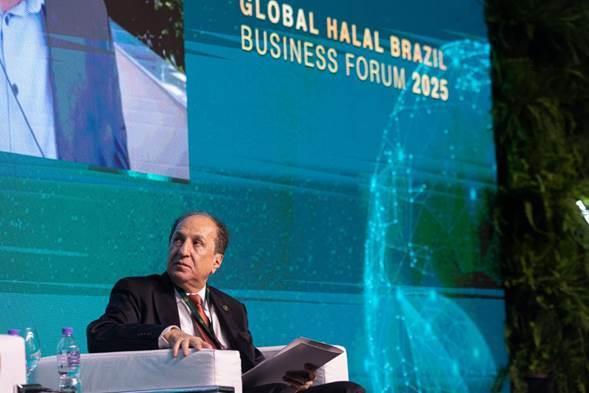
Innovation, Technology Transform Halal Market
The progress, Zoghbi said, is not only quantitative but also qualitative. This is due to two main factors: the use of technology and a consumer base that is increasingly demanding about what they buy. To discuss the applied use of technology in the Brazilian halal meat supply chain, the moderator invited Flávio Redi, executive director of EcoHalal do Brasil, who shared some insights into the certification processes used.

Ali Zoghbi moderated the panel on innovation and technology
“Today, the halal certificate is 100% digital, both for beef and poultry. It comes with a QR code that can be scanned by the end consumer, providing full transparency of the production process,” explained Redi. According to him, blockchain technology-originally developed for cryptocurrencies-was chosen to ensure the necessary transparency.
Inside meatpacking plants, there is what he calls“Industry 4.0,” with cameras monitoring every operation and algorithms managing production.“Now, the project's evolution is moving toward guaranteeing origin-where that meat came from and whether it complies with ESG protocols, which cover all aspects of social and environmental compliance,” the specialist said.
Celso Moretti, president of the Integrated Partnership Board, the governance board of the Consultative Group for International Agricultural Research (CGIAR), spoke about the contribution of biotechnology to this market, highlighting so-called plant-based meats made from cultivated cells or through the action of enzymes, and what would need to be done in this regard to adapt these cultivated non-animal meats to the halal market.
Moretti also spoke about applying the principles of sustainable and precision agriculture within the halal context, combined with the latest technologies, such as the Internet of Things, blockchain, and tokenization, which is beginning to be used in the agricultural supply chain.“It's important to remember that more sustainable food production isn't achieved by technology alone but also through greater coordination among halal certifiers, so that proper data governance is ensured,” he concluded.
More meat, fewer gas emissionsFernando Henrique Albuquerque, a researcher at the Goat and Sheep unit at Brazil's state-run agricultural center Embrapa, discussed what has been done within his area of expertise to position animals like goats and sheep as options for the halal market. He highlighted everything from the ingredients present in these animals' feed, which must be evaluated during certification, to other initiatives by Embrapa aimed at helping mitigate the effects of climate change.
“Crop-livestock-forest initiatives, which take sustainability issues into account along with animal welfare, combined with work on gas-mitigating diets to reduce greenhouse gas emissions-especially in sheep confinement areas-and diets designed to achieve higher production per area are some of Embrapa's initiatives that help in the traceability process,” Albuquerque said.
The final speaker, Fernando Sampaio, Sustainability Director at Brazilian beef industry group ABIEC, emphasized the importance of the Islamic market for Brazil's meat export sector. He discussed the challenges that remain, such as the gap between large and small producers, who suffer from a lack of investment and do not benefit from technological advances, as well as the ongoing issues with traceability in a market as vast as Brazilian agribusiness.
Sampaio reinforced the importance of finding ways to combine food security and the climate crisis with increasingly low-carbon agriculture, highlighting Brazilian government initiatives in this regard ahead of the COP30 Climate Summit to be held in November in Belém. One such initiative is the Tropical Forest Forever Facility (TFFF), a fund to be managed by the World Bank that will compensate those who are helping to conserve forests.
“The other is Caminho Verde Brasil, from the Ministry of Agriculture and Livestock, a program aimed at restoring 40 million hectares of degraded pasturelands by promoting regenerative agriculture, and which is open to private investors. These are two pathways toward more sustainable livestock farming,” Sampaio concluded.
Ali Hussein El Zoghbi closed the panel by saying the halal of the future is already being built.“May this panel inspire us to continue integrating knowledge, faith, tradition, and modernity, so that the halal certification is not only about compliance, but about excellence and, above all, humanity.”
The forum is organized by the Arab-Brazilian Chamber of Commerce (ABCC ) and FAMBRAS Halal Certifier. GHB sponsors include MBRF (Marfrig – BRF), MODON (Saudi Authority for Industrial Cities and Technology Zones), Seara, CaraPreta Carnes Nobres, EcoHalal, Emirates, Grupo MHE9, Laila Travel, Prime Company, and SGS, with catering by Água Mineral Frescca and Pão & Arte Frozen Bread.
Strategic partners include the Islamic Chamber of Commerce and Development (ICCD) and Islamic Chamber Halal Services (ICHS). There is also institutional support from ABIEC, Brazilian Beef, Brazil's chicken and pork lobby ABPA, Brazilian Chicken, International Halal Academy, and the Union of Arab Chambers (UAC).
*Report by Débora Rubin, in collaboration with ANBA
Translated by Guilherme Miranda
Marcelo Brammer/Arab-Brazilian ChamberMarcelo Brammer/Arab-Brazilian Chamber Ali Zoghbi moderated the panel on innovation and technologyThe post Innovation, technology transform halal market appeared first on ANBA News Agency.
.jpg)
Legal Disclaimer:
MENAFN provides the
information “as is” without warranty of any kind. We do not accept
any responsibility or liability for the accuracy, content, images,
videos, licenses, completeness, legality, or reliability of the information
contained in this article. If you have any complaints or copyright
issues related to this article, kindly contact the provider above.

















Comments
No comment